DENVER – A train of tanker cars rammed through the back of a building Tuesday morning in a Denver rail yard.
The mishap unfolded about 7 a.m. July 24 near East 44th Avenue and Sherman Street.
Read the complete story at The Denver Post.
DENVER – A train of tanker cars rammed through the back of a building Tuesday morning in a Denver rail yard.
The mishap unfolded about 7 a.m. July 24 near East 44th Avenue and Sherman Street.
Read the complete story at The Denver Post.
CSX Corporation announced July 16 second quarter net earnings of $535 million or $0.52 per share. For the second quarter of 2012, CSX earned $512 or $0.49 per share. According to these figures, CSX is up a profit of $23 million over last year’s earnings for the same quarter.
CSX attributes these profits to overall revenue growth, service and efficiency results, and other items such as tax and real estate. Revenue for the second quarter 2013 was a total of almost $3.1 billion. CSX was at an operating income of $963 million and an operating ratio of 68.6% for the quarter.
Operating ratio is a railroad’s operating expenses expressed as a percentage of operating revenue, and is considered by economists to be the basic measure of carrier profitability. The lower the operating ratio, the more efficient the railroad.
CSX is up from last quarter, having reported a net income of $459 million or $0.45 per share. Revenue for the first quarter was at $2.96 billion, quite a bit less than this quarter’s reported $3.1 billion.
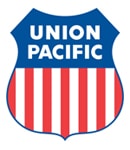
UP saw an increase of operating revenue to $5.5 billion, while last year’s operating revenue for the same quarter was only $5.2 billion. The freight revenue was also at a five percent increase and their operating ratio of 65.7 percent was the best ever recorded at 1.3 points higher than the second quarter last year; and 0.9 points better than the previous best-ever record which was set in the third quarter of 2012.
Second quarter earnings are also up from the first quarter of this year. UP reported increased revenue of $5.29 billion for the first quarter, a great deal less than this quarter’s reported $5.5 billion.
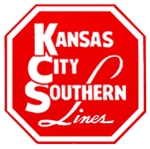
The railroad saw an operating income of $179 million, 12 percent higher than the same quarter of the previous year and an operating ratio of 69.0 percent, a 1.5-point improvement.
Revenue growth for the second quarter was led by a 26 percent increase in Energy, a 20 percent increase in Automotive and a 13 percent increase in Intermodal revenues over last year. Revenues from Chemicals & Petroleum and Industrial & Consumer grew by 11 percent and four percent respectively over last year’s second quarter.
KCS saw a decrease in revenues from Agriculture and Minerals, which decline by 18 percent, due to droughts and a decrease in grain volumes.

CN reported a net gain of C$13 million that resulted from a gain on a non-monetary transaction with another railway. Excluding this transaction, it’s reported that CN saw an increase of diluted earnings per share (EPS) of 11 percent to C$1.66 for the second quarter. The same quarter last year was at C$1.50.
Revenues saw an increase of five percent to C$2,666 million that was reportedly driven by a five percent increase in revenue ton-miles and a two percent increase in carloadings.
CN reported that operating income increased six percent to C$1,042 million with an operating ratio (defined as operating expenses as a percentage of revenue) improvement of 0.4 of a point to 60.9 percent.
“We executed strongly during the second quarter, with service and operating metrics on a steady improvement trend. This performance underscores our agenda of Operational and Service Excellence, which is key to achieve solid revenue growth at low incremental cost. … Despite slower volume growth than anticipated, the CN team will maintain a keen focus on growing revenues faster than the overall economy as well as on tightly managing costs to meet our full-year financial outlook,” said President and Chief Executive Officer Claude Mongeau.
Norfolk Southern (NS) announced Tuesday, July 23 an 11 percent decrease in income for the second quarter 2013. Income was at $465 million for the second quarter of 2013 whereas they were at $524 million for the same quarter of 2012.
Diluted earnings per share were at $1.46, nine percent lower than they were in 2012 at $1.60 per diluted share.
The operating revenues for the railroad came in at $2.8 billion, three percent lower than in 2012. However, the operating ratio came in at 70.2 percent, which is four percent higher than the ratio reported for the second quarter of 2012.
Fuel surcharges came in at $306 million, $59 million less than last year’s reported amounts. General merchandise revenues rose to two percent to $1.6 billion. Coal revenues fell 17 percent to $626 million due to lower average revenue per unit and a four percent decline in volumes. NS reported that Intermodal revenues increased four percent to $588 million and volumes increased five percent due to continued domestic and international growth.
“In the second quarter, Norfolk Southern delivered solid results, supported by growth in our chemicals, intermodal, and automotive businesses, despite continuing weakness in the coal markets,” CEO Wick Moorman state. “We continue to focus on service efficiency and velocity, which is enabling us to control operating expenses and deliver superior performance to our customers.”

Operating income came in at C$420 million, an increase over the second quarter of last year by 76 percent.
Total revenues for CP were C$1.5 billion, an increase of ten percent; also a quarterly record. Operating expenses were low at C$1.1 billion, a decrease of four percent. CP reported a net income of C$252 million or C$1.43 per diluted share.
The second quarter of 2012 had a net income of only C$103 million or C$0.60 per share. The second quarter of 2013 had a 138 percent improvement in year-over-year earnings per share.
Canadian transportation authorities banned one-man crews for trains with dangerous goods Tuesday, responding to calls for tougher regulations after an oil train derailment in Quebec killed 47 people.
Transport Canada also said trains with dangerous goods will not be allowed to be left unattended on a main track. Hand brakes must be applied to trains left one hour or more.
Read the complete story a the Bismarck Tribune.
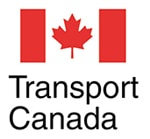
Although the cause of the accident in Lac-Mégantic remains unknown at this time, Transport Canada is moving forward to build upon the safety advisories received last Friday from the Transportation Safety Board and further enhance existing safe railway operations and the security of railway transportation.
Effective immediately, the emergency directive requires all rail operators to:
The safety of Canadians is Transport Canada’s top priority. The department is committed to working with the rail industry to examining any other means of improving rail safety.
Transport Canada has been in contact with the railway industry, and in particular with CN, CP and the Railway Association of Canada (RAC), to work together to promote the continued safety of Canada’s rail system.
The majority of railways maintain a culture of safety and security, as shown by the notable decline in derailments and train accidents over the past few years.
Transport Canada inspectors will continue to work in cooperation with the Transportation Safety Board as it conducts its investigation.
Transport Canada inspectors are at Lac-Mégantic determining whether there has been non-compliance with regulatory requirements.
Railway safety regulations exist to ensure the safety and protection of the public. If these regulations were not followed, the department will not hesitate to take action.
Transport Canada is responsible for transportation policies and programs. It promotes safe, secure, efficient and environmentally-responsible transportation. Transport Canada reports to Parliament and Canadians through the minister of Transport. It works with its portfolio partners, other government departments and jurisdictions, and industry to ensure that all parts of Canada’s transportation system work well.
The complete release, along with Related Items, can be found here.

First place winners will receive HeysUSA Amtrak luggage and Pajanimals Adventure Game. The ten second prize winners will receive an Amtrak hoodie and a Pajanimals Playdate DVD.
Entries to win must be received by July 31, 2013 and be 18 years or older to enter the contest. To enter the sweepstakes visit www.henson.com/PJsweepstakes.
A blinding flash of orange light jarred Weyauwega residents awake before dawn on March 4, 1996. An 81-car freight train had been barrelling toward the farm town in central Wisconsin when it jumped a broken rail. The train’s propane and petroleum cargo had caught fire and exploded.
Gerald Poltrock II, a rookie local police officer, thought it was a prank when the dispatcher called to say the city “blew up.”
Read the complete story at CNews.
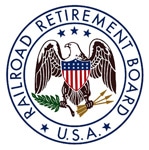
Michael J. Collins, who has been an assistant to the labor member since April 2003, will assume the position of legislative assistant. In that capacity, he will advise the labor member on legislative issues related to the benefit programs administered by the RRB, as well as rail employees and the industry as a whole, and serve as a liaison to congressional offices and legislative directors at rail labor unions.
Barrows also appointed Brigitte A. Munoz as an assistant to the labor member. Munoz, an RRB employee since June 1990, was a railroad retirement claims examiner specializing in disability cases at the time of her appointment.
Before joining the Office of the Labor Member, Collins served as the RRB’s director of survivor benefits. An agency employee since July 1975, he previously served as deputy director of disability and Medicare operations and, before that, as an assistant to the chairman of the board.
Collins, a graduate of the University of Illinois at Chicago (B.S., 1975), is married and has a daughter. He resides in Oak Lawn, Ill.
“Mike Collins has solved hundreds of problems for our members over the past twenty years,” said SMART Transportation Division National Legislative Director. “He deserves to be commended for this promotion.”
Munoz joined the RRB in June 1990 as a claims examiner in the sickness and unemployment benefits program, transferring to the disability benefits program in 2006.
A graduate of Concordia University in River Forest, Ill., (B.A., 1990), Munoz is married with two daughters. She lives in Orland Park, Ill.
Both appointments follow the recent retirement of James C. Boehner, who previously served as legislative assistant to Barrows. Boehner retired in June after almost 40 years of service to the RRB, including more than 33 years in the Office of the Labor Member.
LAC-MEGANTIC, Que. – Insufficient brake force was applied before an oil train slammed into a town in Quebec on July 6 and killed 47 people, officials said Friday.
Donald Ross, chief investigator for the Transportation Safety Board of Canada, said the insufficient brake force could have been due to mechanical problems with the handbrakes, or a problem with the way someone applied them.
Read the complete story at Brandon Sun.
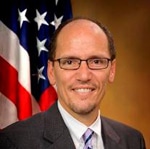
The Senate confirmed Tom Perez as Labor secretary on a 54-46 party-line vote July 18, making him the second of President Barack Obama’s nominees to win confirmation this week following a deal to preserve the filibuster.
Perez won cloture Wednesday on a 60-40 vote, with six Republicans joining 52 Democrats and two independents. His confirmation required only a majority of 51 votes.
Read the complete story at Politico.
President Obama released the following statement:
I welcome today’s confirmation of Tom Perez to serve as Secretary of Labor. Tom has lived the American dream himself, and has dedicated his career to keeping it within reach for hardworking families across the country. At the Department of Labor, Tom will help us continue to grow our economy, help businesses create jobs, make sure workers have the skills those jobs require, and ensure safe workplaces and economic opportunity for all.
I want to thank the Senate once again for agreeing to move forward on Tom and the other nominees who have waited far too long for the yes-or-no votes they deserve.
Joining their fellow train and engine workers employed by the DeQueen & Eastern Railroad, the company’s yardmasters July 17 chose the SMART Transportation Division as their bargaining representative.
By a two-to-one margin, the yardmasters opted for SMART TD.
Train and engine workers employed by DeQueen & Eastern Railroad voted June 20 to elect SMART’s Transportation Division as their collective bargaining representative.
The employees were formerly represented by the UTU, but their collective bargaining agreement was terminated in 2010 when the railroad’s former owner, Weyerhaeuser, sold the company to Patriot Rail.
“It is great to see that these workers sought to return to the UTU and SMART. They never wanted to lose their representation, and we did not abandon them. Their agreement with the railroad was terminated,” said SMART TD Director of Organizing Rich Ross.
Ross commended the hard work of International Organizer Mike Lewis, who led the effort to return the D&ER employees to the SMART TD fold.
Lewis thanked Arkansas State Legislative Director Steve Evans for his assistance throughout the organizing drive.
D&ER and Texas, Oklahoma & Eastern Railroad are two connecting railroads that operate as one over a total of 91 track miles in southeast Oklahoma and southwest Arkansas. They interchange with BNSF Railway via the Kiamichi Railroad at Valliant, Okla.; Kansas City Southern in DeQueen, Ark., and Union Pacific at Perkins, Ark.
D&ER hauls around 35,000 rail carloads a year, primarily forest products, gypsum board, grain and paper.